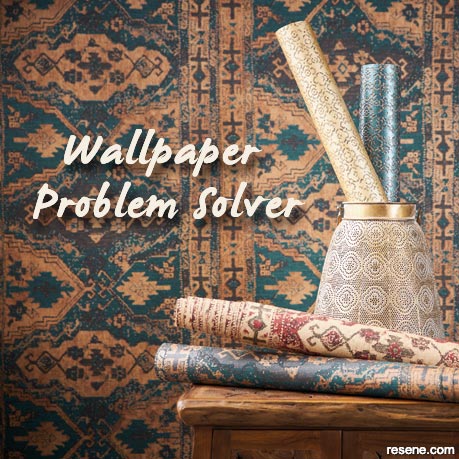From the wallpaper problem solver - quick reference guide
Most stains or staining of the decorative surface of the wallcovering are usually transferred from the wall surface that the product has been installed over.
These discolourations could be caused by a number of contaminants on the wall surface such as oil, old yellowed or sunburnt plasterboard, old stained wallpaper that has not been stripped, or surfaces containing water stains. All these contaminated surfaces can, when wet, transfer the stain through the web or backing paper to the decorative surface of the wallcovering during the drying process.

How to eliminate bleed through and ghosting when wallpapering
All stains that can be transmitted through the backing paper of the new wallcovering should be identified by the installer before starting to install the wallcovering. Old wall paper can, over the years, absorb dirt and grease, and when wetted by the adhesive from the new wallcovering, this can be transmitted through the backing paper to the decorative surface of the new wallcovering, showing as a brown or dark patch.
Plasterboard or dry wall is susceptible to yellowing or sunburn. This is caused when plasterboard has been installed and there has been no covering on it at all for some months. The sunlight burns the fibres of the outer layer of thick paper and slowly the plasterboard darkens to the point where two problems arise.
The first is the paper face of the plasterboard gets darker and darker but the plaster or filler between the plasterboard stays white. This results in a heavy contrast between the dark plasterboard and the white plaster. If a wallcovering is installed over this surface ghosting or show through will occur.
The second problem is the sunburnt plasterboard which, when wetted by the adhesive of the new wallcovering, will produce a brown stain which will transmit through to the decorative surface of the wallcovering.
Water stains: These can be identified by the plasterboard showing lighter in an area. This area will have a dark brown line around the outer perimeter. This stain will be transmitted as the above.
Good preparation can eliminate all problems regarding ghosting, bleed through, and water stains.
To identify if a stain has been transmitted from the wall surface the wallcovering has been installed over, look at the seams. If the stain runs across a seam this proves that it is not a wallcovering problem. Manufacturers cannot make wallcoverings with matching stains.
To eliminate all forms of show through or bleeding, coat the wall surface with an oil based sealer.
Once dry, sand entire surface with 80 grit sandpaper and dust entire surface to remove all dust particles.
Size with a good even coat of Shurstik© Latex premixed size.
Wallpaper problem solver
Thank you to Aspiring Walls for providing the information for this quick reference guide.
Wallpaper problem solver topics Ask an Expert How to wallpaper
Order online now:
Testpots |
Paints |
Primers and Sealers |
Stains |
Clears |
Accessories
![]() Get inspired ! Subscribe
Get inspired ! Subscribe ![]() Get saving ! Apply for a DIY card
Get saving ! Apply for a DIY card
Can't find what you're looking for? Ask us!
Company profile | Terms | Privacy policy | Quality and environmental policy | Health and safety policy
Colours shown on this website are a representation only. Please refer to the actual paint or product sample. Resene colour charts, testpots and samples are available for ordering online. See measurements/conversions for more details on how electronic colour values are achieved.
What's new | Specifiers | Painters | DIYers | Artists | Kids | Sitemap | Home | TOP ⇧
